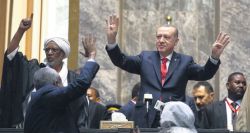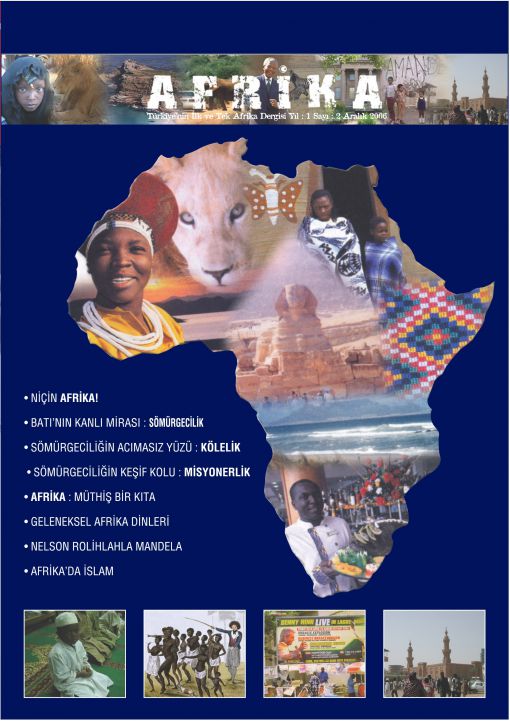
ERDOĞAN'S TRI-COUNTRY VISIT BOOSTS TURKEY'S RISING SOFT POWER IN AFRICA.  Ankara continues its open to Africa policy with a four-day visit to Sudan, Chad and Tunisia, aiming to boost business ties while diminishing the FETÖ activities on the continent. President Recep Tayyip Erdoğan's visit to Sudan, Chad and Tunisia is a new step with high diplomatic value to increase Ankara's influence in the region, as part of Turkey's foreign policy for the continent and efforts to establish a presence through soft power. On Sunday, Erdoğan arrived in Sudan, the first stop in his four-day trip in Africa and also the first time a Turkish president has visited the country. Following Sudan, he will visit Chad and then Tunisia. Erdoğan's visit in Chad today is also the first time a Turkish president has ever visited the country. Mustafa Efe, head of the Ankara-based Africa Strategic Research Center, said that "Today, we are logistically close to these regions thanks to technological developments. Yet, there is a gap between our memories from the past, as the ties go back to the Ottoman era. These presidential visits have an importance in filling this gap." Efe also added that "Africa strengthens Turkey's hand in diversifying its foreign policy," citing that in the past few years, the number of Turkish diplomatic missions on the continent rose from 12 in 2009 to 42 today.
Historically, the Ottoman Empire, which ruled parts of the Middle East, North Africa and Eastern Europe for over 500 years, had a foothold in Africa, which ended after the foundation of the Republic of Turkey in 1923, due to the Western oriented foreign policy. Since 2002, Turkey began to be active on the continent with a new opening policy for Africa as well as the declaration of 2005 as the year of Africa. Since then, Turkey has been highly active on the continent to the extent that in 2011, the African Economic Outlook (AEO) declared Turkey one of the most important partners of the continent. Turkey was also the second-largest humanitarian donor in the world, following the U.S., according to a Global Humanitarian Assistance Report in 2017, due to its contributions to Africa.
"It is worth mentioning that when we say the African continent, we refer to a place has more than 50 countries and hundreds of different cultures and languages," Hatice Uğur, an Africa studies academic emphasized.
Speaking to reporters at Esenboğa Airport in Ankara before heading to Sudan, Erdoğan said Turkey aims to further strengthen cooperation with Africa and discuss boosting ongoing regional business ties as well as targeting the Gülenist Terror Group's (FETÖ) exploitation of Africa. This is the second presidential trip to African countries this year, coming after Erdoğan's visits to Tanzania, Mozambique and Madagascar in January of this year, making him the leader who made the highest number of visits to Africa among world leaders.
Professor Ahmet Kavas, dean of Istanbul Medeniyet University's Political Science Department and the former Turkish envoy to Chad, said this visit will start the process of finding new interaction areas in ties with Sudan, Chad and Tunisia while serious economic projects will also be launched.
"Although we cooperated with these countries and fought against colonialism on the same side at the beginning of the century, we took a century-long break afterward," Kavas said, adding that this visit will also give the opportunity to observe which level the first action plans that were made regarding Africa in 2005 reached in the past 12 years.
"The continent needs serious technology know-how transfer from Turkey," Efe said, emphasizing that Turkey has a historical role on the continent and since it does not have an exploitative legacy, its image is also quite good in African societies.
In addition to mutual relationships, Erdoğan also said that many African countries deported FETÖ members following the deadly July 15, 2016 coup attempt and transferred the control of FETÖ schools to Turkey's Maarif Foundation, adding that he hopes more action will be taken against the group.
"We know very well that they are the volunteering subcontractors of the imperialists," Erdoğan asserted during the press conference, and added that Ankara wants to increase the transfer of FETÖ-linked schools in Africa to Turkish authorities.
Aware of the threat FETÖ poses to Africa, Ankara has been trying to replace FETÖ-run schools on the continent with Turkish state-sponsored schools.
The Maarif Foundation is a not-for-profit, state-funded body that runs schools outside Turkey. It has taken over schools around the world previously run by FETÖ, which was behind last year's defeated coup in Turkey, including 32 in Africa, according to figures released by the National Ministry of Education.
"We are determined not to let these murderers find shelter on the African continent. I think that this visit is also important from this perspective as well," he said.
According to Kavas, this presidential visit will hasten the process of ending FETÖ activities on the continent.
Erdoğan was greeted at Khartoum International Airport by Sudanese President Omar al-Bashir. At a joint press conference following a closed-door meeting with Bashir, Erdoğan said Turkey wants to boost the two countries' bilateral trade volume. "We need to raise our trade volume to $1 billion and then to $10 billion. We have to take appropriate steps for this," Erdoğan said.
In terms of the importance of Sudan for Turkey, Efe referred to the country's past. "Sudan is one of the first countries on the continent to gain independence. Since it was a part of the Ottoman Empire, it is also a country that is culturally very close to Turkey," he said, mentioning the rich resources of the country. "Yet, due to embargoes, the country is unable to export what it produces, for which Turkey may make a difference."
Erdoğan also said the two leaders agreed to set up a high-level strategic council to increase the economic cooperation between the two countries. Both countries Sunday signed 12 agreements pertaining to defense cooperation, mining, agriculture, forest, science, education, tourism, the environment, support for small businesses and establishment of a strategic council.
Sudan, once a unified country, was divided in two in 2011 after the Christian and native religion majority south voted in a referendum to secede, as part of the peace agreement signed in 2005, ending a civil war of more than two decades. In the north, the population is mostly Muslims. During the conflict, more than 1.5 million people were killed and hundreds of thousands of people were forced from their homes.
"Sudan is a very strategic country that has the port city of Suakin, which connects the Red Sea with the Indian Ocean. Thus, it may be the only country that may enable Turkey to reach the western Indian Ocean," Uğur said about the strategic importance of the country.
After Sudan, Erdoğan will head to the Chadian capital of N'Djamena today. Ahead of Erdoğan's visit to Chad, the Maarif Foundation signed an agreement with Chadian authorities to transfer the administration of five FETÖ schools and a dormitory. Among these institutions are a kindergarten, a primary school, two secondary schools and two high schools in addition to the dormitory. The institutions will continue operating with new administrators and teachers sent by Maarif.
In a speech, Turkey's Ambassador to Chad Erdal Sabri Ergen thanked the heads of Maarif. "These schools will greatly contribute to Chad's education system," he said.
Speaking to Anadolu Agency (AA), Chad's Education Minister Ahmad Khazali Acyl said the school transfer was an important step in relations between the two counties.
According to Uğur, Chad is one of the important centers of sub-Saharan Africa since it is a part of one of the most active trade networks on the continent.
"Chad is one of the poorest countries in the world," Efe said. Regarding the country's importance, he cited the oil resources that were discovered seven to eight years ago.
"Although the oil is quite valuable, there is a governance problem in Africa in general. They do not have the ability to take advantage of their own resources. Thus, Chad needs Turkey's support to avoid falling into the trap of the so called oil curse," he said.
"Turkish-Chadian relations had a turning point after 2002, and in 2017, a new page has turned in mutual relations," Kavas said, adding that Turkey has many mutual projects with Chad regarding education, agriculture and animal husbandry.
On the last day of the three-day visit, Erdoğan is scheduled to fly to Tunis, the capital of Tunisia. |
|
1679 kez okundu
YorumlarHenüz yorum yapılmamış. İlk yorumu yapmak için tıklayın |






